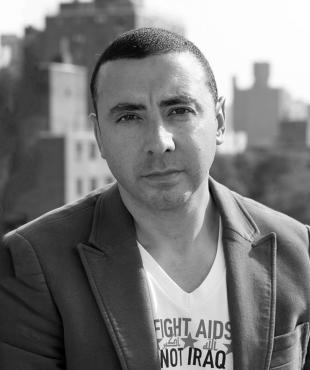
Robert Cordero
SSA alumnus has advice for students and grads entering social work
Over the last two years, a groundbreaking social enterprise called the GrandLo Café on New York City's Lower East Side provided job training to more than 100 teens and young adults who were unemployed or not in school. The covid-19 pandemic brought that to a halt.
"We had to make a decision to close GrandLo Café as a restaurant and as a program within two weeks of the March 16 stay-at-home order because we had no more sales and no more catering and events," said Robert Cordero, AM '97, executive director of New York City's Grand St. Settlement. "We're converting that space at 168 Broome Street into a community resource center to focus on helping people navigate benefits and connect them to services."
Cordero, an SSA alumnus and Chicago native, has spent the last 20 years in New York City, the last five in his current position. Yet he still brings a certain Chicago toughness and blue-collar work ethic, and Puerto Rican passion to his work at Grand St. Settlement, an organization that has served New York's highest-need citizens for more than a century.
"While this is a crisis of historic proportions, it is not going to defeat the mission of Grand St. Settlement," Cordero says. The settlement, he insists, "is destined to be resilient and to continue."
The settlement already had programs and services designed to help the 13,000 families it serves to secure public assistance, "but everything has shifted in response to the coronavirus here in New York," he says. "There are new benefits and entitlements that, frankly, folks don't know they're eligible to receive."
Cordero and his team have focused on Grand Street's core mission, and how to financially support that mission. "Our finances going into this crisis were very strong," he says. The crisis has brought into clear focus the basic needs of families, especially low-income families who are struggling economically and who live in public housing or unstable housing.
"So much of our work was already what the government has deemed essential services." These include caring for senior citizens, making sure that families are not struggling with financial insecurity and food insecurity, and serving more than 800 children in the settlement's childcare programs, including its Head Start program.
Cordero is himself the beneficiary of the Head Start program at Chicago's Erie Neighborhood House. Thanks to Head Start, he entered kindergarten already knowing how to read. "I always knew, from elementary school, high school, all the way through college and the University of Chicago School of Social Service Administration that the rocket fuel for my educational experience was Erie House," he says. "Head Start and Erie House really changed the trajectory of my life."
The COVID-19 pandemic has decimated many non-profit organizations across the country. New York City's Grand St. Settlement, however, has vigorously responded to the crisis while aggressively and effectively pursuing new funding sources.
"You can talk about crisis management all you want, but until you have a real situation, it's hard to see how people will react," said David M. Lee, MBA '87, a member of the Booth School of Business Council and Grand St. Settlement's board of directors. "Robert has been extremely calm and collected through this whole crisis."
Lee, who is the chief risk officer and managing director of Credit Suisse Asset Management, sees Cordero's management style as "holistic." He credits that to Cordero's SSA training. "I'm a bit biased, but that Chicago training really helped him because he's very well versed in many disciplines," Lee says.
After graduating from Northern Illinois University, Cordero taught elementary school for five years at Jose Diego Community Academy in the West Town, Humboldt Park neighborhood where he grew up. Since graduating from SSA, he has worked a variety of social service and policy jobs in Los Angeles, Chicago, Washington, D.C., and New York City.
He advises people who are interested in social work as a career as well as current students to make sure that social work is what they want to do, "but don't worry so much about the specifics of what you think it's going to be. Follow your passion and you will wind up in wonderful, unexpected places doing really impactful work."
Grand St. Settlement has also found itself on the frontlines of the fight against systemic racism in New York City as tensions and protests grow following the murder of George Floyd. Awarded by Nonprofit New York for their work in Diversity, Equity, and Inclusion in 2018, Cordero has focused on racial equity at every level in the organization. "Social work has an important role in working with those who have been affected by police brutality and racist systems. We must translate pain into power."
SSA's newest graduating class enters a world in crisis, which means that every aspect of the social work profession is more important and essential than ever, Cordero says. "Whether you're a clinician or an administrator shaping policy, social workers need to be at the vanguard in dealing with this crisis and the inevitability of future crises."
This has always held true. Social workers such as SSA's Founding Mothers Edith Abbott and Sophonisba Breckinridge, who pioneered the profession in the first decades of the 20th century, were among the first to recognize that improper sewage disposal and insanitary living and working conditions were a threat to public health. Doctors and nurses were seeing patients, not their living environments.
"But social workers were there in the streets doing home and factory visits and figured out that connection," Cordero says. "We have that same role in 2020, the ability to do that."
--Steve Koppes